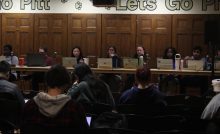New app helps trans people with voice training and gender confirmation


The Cathedral of Learning.
For Alex Ahmed, voice is important for transgender people because it can help solidify their gender identity.
“Voice can be a source of physical and emotional stress. It can trigger and exacerbate anxiety and depression,” Ahmed said.
Ahmed, web developer and Northeastern University’s doctorate student, spoke at the Research, Ethics and Society Initiative Seminar Series & Gender and Science Conversation Series on Wednesday over Zoom. Ahmed spoke about her research and development on a voice training app for transgender people she designed called Project Spectra. At the event she discussed various voice training apps, looked at their framework and discussed their effectiveness and how they function.
Ahmed explained how she and a community team of about 20 members created Project Spectra over the course of a year and a half.
“Our first goal was affirmation, that users should feel like their choices and identities are respected and validated,” Ahmed said. “People can personalize the app with their name and their specific goals for voice training, which can include a pitch goal, which recognizes, or tries to recognize, the fact that identities are flexible and constantly changing.”
Ahmed and her team utilize her research and observation of other voice training apps to create the most effective and inclusive tool yet. According to Ahmed, Spectra also allows users to see their progression, given as a numbered pitch scale that lets them know if they are or are not close to their goals. Compared to other apps, which use gendered language, Ahmed said this way of reading data is far less discouraging and enforcing.
“We are trying to collaboratively create a free app that could be a departure from the harmful elements of other apps with mixed results,” Ahmed said. “We were also putting ourselves in this. What would we want? What might we find useful in this?”
Rather than having to pay for a single speech therapist, Spectra would offer free daily exercises. In addition to these exercises, the team had a heavy emphasis on users avoiding straining their voices. Ahmed said the app tries to do more than just correct pitch, but also help protect and strengthen users’ voices.
“And so we had this emphasis, not so much on reaching the correct pitch, but on vocal strengthening exercises,” Ahmed said. “We also had a few excellent other exercises on here, you see which to do per day, how much to do to avoid real vocal strain.”
During a study she asked a group of transgender people about their experiences and feelings with their voices and their gender. According to Ahmed, one participant “felt intimidated” by the need to physically express her gender. Ahmed said the participant felt if she couldn’t instantly transition “she would suffer some consequences,” and therefore it took a long time to transition. Ahmed added that because the participant lacked gender-affirming resources, it affected her mental health.
According to Ahmed, comparing the transitions of transgender people in media can lead others to get disheartened with their own progress — they may feel like a “failure.” This is why it is important to not only have accessible gender-affirming technology, but ones that encourage growth and understanding, according to Ahmed.
“Everyone negotiates our own presentation or an identity in our social environments,” Ahmed said. “But trans people are at the highest risk of being punished based on transgressing norms … so I concluded that any attempt to create technology in this space has to prioritize flexibility and self-determination.”
In creating Project Spectra, Ahmed was inspired by problems with voice training apps currently on the market. She compared multiple voice-training apps, one of which gives users their voice results as percentages of male, female or neither. Ahmed said it is harmful to show progression in terms of whether someone is man or woman enough.
“It is evoking some harmful tropes about trans people being partly men, partly women, partly both or partly neither,” Ahmed said. “Essentially, rating people based on their pitch to determine how much of each gender they are.”
Additionally, this app uses donut charts which “are basically pie charts, except the inside is cut out,” causing a mismatch between the data and its visualization, according to Ahmed — which ultimately can confuse and discourage users.
The second app Ahmed gave as an example, created by transgender designers, looks at the ranges of pitch and visualizes them as a spectrum. Ahmed claims she “thinks this was intentional on the part of designers.” While the apps represent the ranges of pitches in different charts “both of them emphasize that the quantitative value of the pitch is important and relevant information.” Another app she looks at is the EVA app, which allows users to get direct feedback from speech therapists in a voiceover.
Ahmed said Project Spectra allows queer people to create a better, more inclusive world — one that she and many queer people strive for.
“To prefigure the world we wish to see and create opportunities for new organizing,” Ahmed said. “To assert our own ownership over technology, rather than just receiving whatever it is our tech overlords want us to use.”
Recent Posts
SGB addresses concerns about ICE presence on campus, hears SJP lawsuit against administration, approves governing code bill
At its weekly meeting on Tuesday at Nordy’s Place, Student Government Board heard concerns about…
ACLU of Pennsylvania sues Pitt over SJP suspension
The ACLU of Pennsylvania filed a federal civil lawsuit against the University of Pittsburgh and…
Marquan Pope: The ultimate shark
One of the most remarkable things about sharks is that an injury doesn’t deter them.…
Who Asked? // Do we really get a summer vacation?
This installment of Who Asked? by staff writer Brynn Murawski mourns the seemingly impossible perfect…
Notes From an Average Girl // Notes from my junior year
In this edition of Notes From an Average Girl, senior staff writer Madeline Milchman reflects…
Meaning at the Movies // The Power of the Movie Theater
In this edition of “Meaning at the Movies,” staff writer Lauren Deaton discusses her love…

